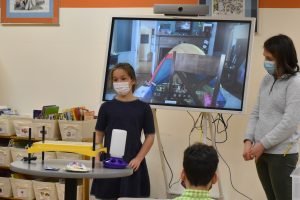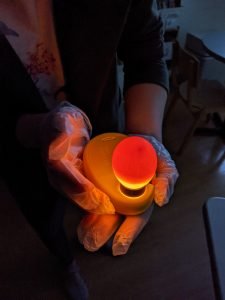Lower Elementary students have launched an exciting, multi-layered project on chickens. They will be hatching baby chicks on campus and using this as a foundation to explore chickens and many interconnected subjects. One of our third graders has stepped up as the resident expert since her family raises chickens and goats on their property. This student and her mom brought in 18 eggs from her home last week and placed them in an incubator at school. It will take about 21 days for the eggs to hatch. Once the chicks are born, we’ll be able to keep them at school for about a week so the students can experience the whole process. The chicks will then return to the chicken coops on the family’s property or will be shared with other families who raise chickens.
 The teacher is using this opportunity to provide the students with a deeply immersive learning experience that involves the students designing their own chicken coops using research and an understanding of chickens and their habitats. I sat in on their class this week, where the teacher helped the students understand all of the details involved in this practical, real-life project with direct connections to the school’s curriculum.
The teacher is using this opportunity to provide the students with a deeply immersive learning experience that involves the students designing their own chicken coops using research and an understanding of chickens and their habitats. I sat in on their class this week, where the teacher helped the students understand all of the details involved in this practical, real-life project with direct connections to the school’s curriculum.
The project will incorporate a number of important curricular elements:
- Understanding more about care for animals and their habitats
- Learning about how to shelter chickens for warmth and safety from predators
- Going through a pre-design process to understand the key elements of a chicken coop, both inside and outside
- Illustrating a design showing the inside and outside of a chicken coop, as well as a bird’s eye view
- Considering the placement of the chicken coop on a property for the safety of the chickens and the practical requirements of the care that must be provided
- Learning how to care for chickens who live in a chicken coop and how to maintain the structure
- Learning to balance unique or original designs with the practical and realistic components of solving the design problem
 The teacher’s initial goal was to provide students with a hands-on, practical life experience that would feel a lot more like school in pre-COVID times. Opportunities for additional skills include:
The teacher’s initial goal was to provide students with a hands-on, practical life experience that would feel a lot more like school in pre-COVID times. Opportunities for additional skills include:
- temperature & humidity tracking which will lead to graphing at the end
- tracking days on a calendar
- learning the life cycle of a chicken
- Learning how to ask good questions
- Social emotional learning – processing emotions if not all the eggs hatch, or more importantly what happens it one does, but does not survive
- Observation – when candling the eggs, students actually get to see inside the eggs and watch the life cycle happening
From the perspective of our Montessori philosophy, the teacher told me, “At our school we have the benefit of setting the incubator up in a shared space, therefore, the other Lower Elementary classroom can join right along with the project. This promotes a whole community instead of one special learning opportunity for one class. I’m already thinking of ways to spread it across the whole school. I’ve sent out emails with updates, pictures, and presentations. Also, the students have the opportunity to run with this project. They have the opportunity to learn so much more than just knowing about chickens. I hope this project will spark students’ interests to study and compare other life cycles as well.”





